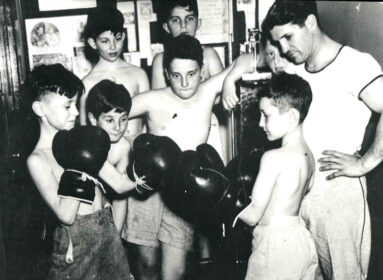By Leora Tec
“I’m not Polish,” I tell the African man in my French class at L’Institut de Francais. Of course he thought I was. I had just told him that my mother was born in Poland. “I’m Jewish. It’s different.”
(“I’m Jewish, so I’m different?”)
I grew up with a strong Jewish identity. My dad was a doctor in Israel’s War of Independence. My mother is a Holocaust survivor and a Holocaust scholar who focuses on rescue and resistance during the Holocaust, so I knew about “good” Poles. I also knew that Poles and Jews were separate entities. You don’t say “Catholic Poles and Jewish Poles.” You say “Poles” and “Jews.” And it’s clear that “Poles” are not Jewish.
I have lived or studied in Spain, France Italy and Israel. I love languages and studied Spanish, French, Italian, Portuguese, ASL, Amharic, Hebrew, Yiddish, German and Arabic. Not Polish.
Why not Polish? Why no interest in traveling to the country of my ancestors, of my mother’s birth and my cousins’, aunts’, uncles’ and great-grandparents’ deaths?
I was separate from Poland. They had rejected my people, had stood by while we were murdered and I did not owe them any allegiance. I did not owe them any interest.
 The first time I went to Poland was in 2005 when my mother’s memoir, Dry Tears, was translated into Polish and she and my dad invited me on the book tour. We spent one night in Lublin where my mother was born. On that trip I was surrounded by non-Jewish Poles dedicating their lives to preserving the memory of Polish Jewry. I was intrigued. I wanted to know more.
The first time I went to Poland was in 2005 when my mother’s memoir, Dry Tears, was translated into Polish and she and my dad invited me on the book tour. We spent one night in Lublin where my mother was born. On that trip I was surrounded by non-Jewish Poles dedicating their lives to preserving the memory of Polish Jewry. I was intrigued. I wanted to know more.
Two years later the opportunity came. Both of my children would be away for the summer so I decided to spend a couple of weeks studying Polish in Poland. But where? Krakow? Warsaw? Lublin? I asked my mother’s friends. One of them, a scholar of English and Yiddish literature, Monika Garbowska, told me that the Catholic University in Lublin boasted an excellent Polish language program. Why not Lublin?
Later, I marveled at the fact that I could have considered going anywhere but Lublin, the city where my grandfather had a candle factory, where my grandmother’s red-haired younger sister Zelda was taken away in a cart bound for death, my grandmother running after her screaming. The city where the ghosts of my ancestors and their friends and neighbors yet dwell. It had to be Lublin.
During those two weeks in the summer of 2007 I got to know two men, Tomek Pietrosiewicz and Witek Dabrowski in charge of Brama Grodzka/Teatr NN, a cultural institution and theater dedicated to preserving the memory of pre-war Jewish life in Lublin. Brama Grodzka (Grodzka Gate in English) stands at what was once the border between two worlds: the Jewish and Christian quarters of the old city. Tomek is the genius behind the place. Witek is the cultural ambassador, the storyteller.

In Otwock, Poland, (l to r) Liam Tec, Leora Tec, Witek Dabrowski and his brother Zenek Dabrowksi, look at photographs of Tec’s family, shown to them by Jadwiga, who was a child during the war when her family saved Tec’s mother from the Nazis.
Tomek told me that he knew he had to do this work when Jewish children “started coming to him.” First he remembered a story that his elderly teacher had told him in grammar school. She said that she had witnessed a small Jewish boy being dragged to his execution by the Germans and that the boy’s hair had turned white in five minutes. As an adult, Tomek remembered the story but when he asked his classmates none of them did. He realized that he was the only living person who could carry the memory of this boy’s last moments and it was a responsibility he was honor bound to undertake.
Henio Zytomirski is another Jewish child who came to Tomek, this time through photos taken of the boy by his father every year on his birthday. At Brama one picture is blown up to life size. Henio is an angelic looking six-year-old. This particular photo is the last photo taken of Henio before he was deported to Majdanek, the death camp on the outskirts of Lublin. Henio was very happy in this picture because on that day he had learned to ride a bicycle without training wheels.
To look at the picture could break your heart. His black hair is slicked back, he wears shorts, black shoes, white socks. Henio never got to go to school. He was murdered by the Germans in Majdanek. Every year on his birthday, Brama Grodzka organizes a walk from the place where that last picture was taken to Henio’s house in the ghetto, and then back to Brama where the participants write him letters. The letters come back to Brama return to sender, of course, because there is no Henio there to receive them. And they keep the letters. For Henio.
Witek takes me on a tour of Jewish Lublin.
The only thing remaining of the main Jewish street, Ulica Szeroka, or Broadway, the street where my mother was born, is a well that now sits in the middle of the main bus station. Witek explains, “The well is the source of water and water is the source of life.”
I spend two weeks with Tomek and Witek, singing Yiddish songs, sipping disgusting Ukranian whiskey and trying not to cry. Two weeks with these men, these “Poles,” the keepers of my ancestors’ stories. Witek and I were both born in 1961.
“If there had been no War,” he says, “we might have been classmates. We would have been friends.”
He describes himself as a goy mit a yiddishe neshoma (a gentile with a Jewish soul). These are my people. Lublin is home. So, if I tell you that I am not Polish, don’t believe me. It’s a lie.
Leora Tec is a writer and founder of Bridge To Poland. A native of Westport, she now resides in Massachusetts. Leora is the daughter of Nechama Tec and Dr. Leon Tec z”l.








 Southern New England Jewish Ledger
Southern New England Jewish Ledger














